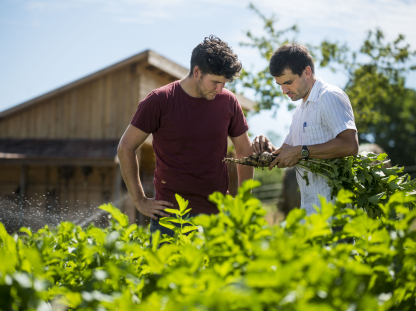Globally and in the EU, the market for organic products continued to grow in 2021
The latest statistics on worldwide organic farming have been published
BIOFACH, the world's largest international fair presenting organic products, was held in Germany between 14 and 17 February 2023. During these four days, in addition to getting to know the companies involved in the production of organic food and their products, an international expert conference was convened, and included a number of sessions discussing the strategic issues currently facing the sector, including questions of policy, sustainability, science and trade. One of the most prominent recurring events at BIOFACH is the presentation of the statistical yearbook on organic farming worldwide. The latest edition of ‘The World of Organic Agriculture’, published by FiBL/IFOAM, gives an idea of the global, European and domestic situation of organic farming based on 2021 data. The now traditional session held by the Research Institute of Organic Agriculture (ÖMKi), featuring decision-makers from Central and Eastern Europe, likewise attracted great interest.
The global organic market continued to grow in 2021, albeit more slowly
For the first time since the pandemic, BIOFACH, the most important event in organic farming, was once again held again at its traditional date in February, in Nuremberg, Germany. The latest data on global organic farming were presented by the FiBL Research Institute of Organic Agriculture and IFOAM – Organics International on February 14, 2023, as part of the presentation of the statistical yearbook ‘The World of Organic Agriculture’. According to the data in the yearbook, now on its 24th annual edition, the general growth trend observed over the past few decades continued in 2021, albeit at a slower pace. Based on data from 191 countries, both the area under organic cultivation and the retail sales turnover for organic products increased worldwide. In 2021, the global size of the organic market was close to 125 billion euros, indicating an increase of about 3 percent compared to 2020. There were no significant changes among the leading countries in market terms. The United States continues to be the world's leading organic product ‘marketplace’, with an annual turnover of €48.6 billion, followed by Germany (€15.9 billion) and France (€12.7 billion). Globally, the number of organic producers increased by 4.9 percent, to 3.7 million people. India remains the country with the largest number of organic producers (1.6 million) in the world.
At the opening of BIOFACH, Karen Mapusua, president of IFOAM – Organics International, drew attention to the work of organic producers selling to local markets, who produce species and varieties that cannot be found on large farms. When it comes to preserving the diversity of plants in agriculture, the continued cultivation of these plants and the transfer of knowledge related to their use are crucial. In this way, organic producers worldwide contribute to ensuring food self-sufficiency.
Comparing the continents, the proportion of areas under organic cultivation increased in Africa, Asia, Europe and Oceania, but decreased in America. Globally, almost half the agricultural area under managed organic cultivation was in Oceania (35.9 million hectares). Europe had the second largest area (17.8 million hectares), while Latin America had the third largest (9.9 million hectares).
In 2021, 1.6 percent of the world's agricultural land was under organic cultivation. In many countries, however, the ratio is much higher: the largest proportion is in Liechtenstein (40.2 percent), followed by Samoa (29.1 percent) and Austria (26.5 percent). In twenty countries, 10 percent or more of all agricultural land was under organic cultivation (including 15 European countries).
Europe forges ahead
In 2021, 17.8 million hectares of agricultural land in Europe were cultivated in accordance with organic farming regulations (including 15.6 million hectares inside the European Union). This is 800,000 hectares more than in 2020. In terms of individual countries, France continued to occupy first place (with almost 2.8 million hectares), followed by Spain (2.6 million hectares), Italy (2.2 million hectares) and Germany (1.8 million hectares). In Europe, areas under organic cultivation accounted for 3.6 percent of all agricultural land, while within the European Union this ratio was 9.6 percent.
In addition to the growth of the area, an increase of almost 4 percent in the retail turnover of organic food was noted in Europe, reaching a remarkable €54.5 billion in total. This made the European Union the world's largest single market for organic products (overtaking even the United States). In 2021, European consumers spent an average of €65.70 per person on organic food (and €104.30 euros per person in the European Union). Broken down by country, Swiss consumers spent the most on organic food (€425 per person on average), while the country with the highest market share for organic food continued to be Denmark, where it comprises 13 percent of the total food market. Per capita consumer spending on organic food in EU member states doubled in the decade between 2012 and 2021.
Nor was the development of the organic sector in Europe interrupted by the pandemic. Although market growth slowed down, the continuous expansion of the sector did not stop in 2021. When planning the new cycle of the Common Agricultural Policy (CAP), many countries continued or initiated activities supporting organic agriculture, including new growth-promoting organic farming action plans and area-based support calls (the next organic appeal in Hungary is expected in 2025). Promotional grants are available for the development of the market.
The ÖMKi session: Organic management action plans and CAP strategic plans: prospects and synergies in the Central and Eastern European region
The focus of the – now traditional – session held by the Research Institute of Organic Agriculture was the strategic CAP plans of Central and Eastern European countries, which have been adopted by the European Commission since the last BIOFACH. The meeting was attended by high-level policymakers from the Central and Eastern European region, who were able to shed light on the opportunities and challenges facing the development of the organic sector, keeping in mind cooperation as well as competition.
Representatives from Bulgaria, Poland, Romania and Hungary also discussed how their countries are contributing to the implementation of the objectives of the European Organic Farming Action Plan (one of the most important of which is that the proportion of agricultural land under organic cultivation should reach 25 percent by 2030). Each member state has a target number in its national CAP strategic plan for the share of organic land it plans to achieve by 2027. Among the listed member states, Poland stands out, as according to preliminary data for 2022, there are 21,000 organic farmers and 550,000 hectares of organically farmed land. The national goal is to reach 1 million hectares.
Ukraine and Serbia presented their aspirations as non-EU countries. Serbia is committed to the European integration process, and although currently the legal framework for organic farming is not the same as in the EU, it intends to gradually transition to it. At the same time, Serbian representatives acknowledged that this process will require significant changes in the field of agriculture and rural development.
Ukraine has a significant area under organic cultivation, amounting to some half a million hectares of arable land in total. The number of organic products produced is increasing, especially with regard to products with higher added value. In 2022, despite the war, exports of Ukrainian organic products increased by 13%.
In Hungary, in 2022, the Ministry of Agriculture adopted a national action plan for the development of organic agriculture (National Action Plan for the Development of Organic Farming 2022-2027). ÖMKi, with its ten years of research and both domestic and international organic farming experience, has taken on a role in the preparation of the document, the implementation of which will begin in 2023. This strategic document sets a target of 10% organic land by 2027. In addition to area-based subsidies, the document foresees additional measures for the balanced development of the organic farming sector, such as the establishment of a national organic consultation network, the collection of market data for organic products, the promotion of domestic products and practice-oriented research and development.
Dr Dóra Drexler, Director of ÖMKi and Vice President of IFOAM Organics Europe, summarised the situation in Hungary as follows: ‘In Hungary, the size of the area under organic cultivation doubled between 2012 and 2019. Although a slight decrease was recorded between 2020 and 2021 – meaning that 5.91 percent of total agricultural area was under organic cultivation – thanks to the new organic subsidy programme announced in 2021, starting from 2022 we confidently expect an increase of around 1,000 new organic producers and an expansion of around 40,000 hectares of total area. At the exhibition, we were pleased to see Hungarian food industry entrepreneurs putting their organic products on display at the Hungarian community stand. These included cold-pressed oils, dry pasta, truffle-based products, and paprika, as well as domestically produced grains, oilseeds, frozen vegetables, fruits and vegan superfoods. One of the focus areas of the Organic Action Plan is the development of product paths, so the goal is not only to increase the size of the organic area, but also to increase the volume and processing level of the agricultural products produced.’
In the session organized by ÖMKi, Dr Oszkár Ökrös, the Deputy State Secretary responsible for international relations at the Ministry of Agriculture, highlighted that the national action plan aimed at domestic organic farming pays particular attention to the system-level coordination of support tools and the increase of domestic supply and demand, as well as education and training and for the development of a network of consultants and experts.





.jpg)






